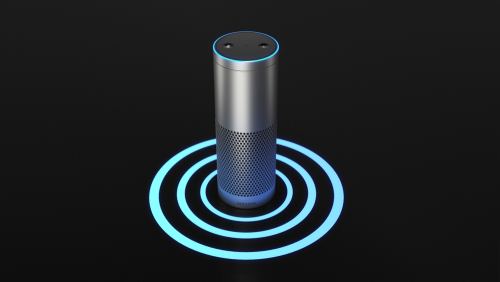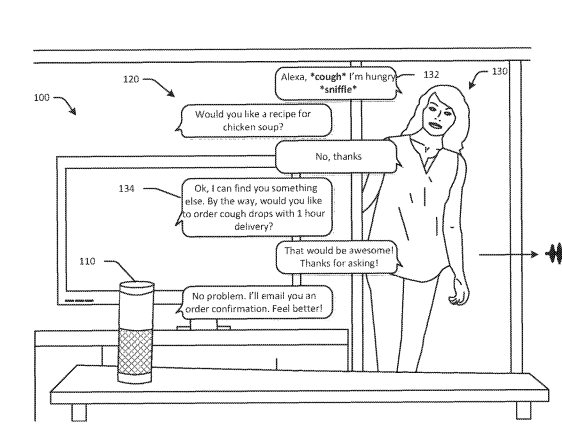



Get new exclusive access to healthcare business reports & breaking news




Good news for those who regularly use a home assistant! Amazon has patented a new version of its virtual assistant Alexa. The new feature is supposed to use speech analysis to recognize signs of illness or emotion. The app will detect whether the speaker is ill and offer to sell them medicine.
The patent presents the example of a woman coughing and sniffling during her inquiry of the Amazon Echo device. At first, Alexa suggests chicken soup could help with her cold, and then asks whether to order cough drops on Amazon.


As happens with all technological advancements, one gets so used to having them around, one rarely remembers when exactly they became part of our lives. Amazon’s Alexa, for instance, was introduced to us just six years ago, became a massive success, and is now present in some 20 million American homes.
The new gadget was supposed to provide a personal assistant for both homes and offices. The device became so available, with minimal effort, that people have grown dependant on it, making it ubiquitous.
Calling out one word – her name – brings Alexa to life. Users can set reminders, shop, receive answers to simple questions (for example: how is the weather outside?). All this can be done while users go about their usual morning routine and without having to open a laptop, tablet, or mobile device.
What made Alexa and the family of similar devices succeed was probably their ability to adapt and become smarter while being used. They learn to recognize the user’s voice, speech patterns and even the more frequent demands. Alexa and her kin became part of our lives because of their efficiency, reliability and unbiased nature–the most significant qualities we would look for in a human personal assistant. Alexa offers the added bonus of discretion, because it is not a person who knows the most intimate parts of one’s life.
From ordering Ubers to singing children to sleep, Alexa has become almost a member of the household, and experts estimate Amazon accounts for more than 70% of the smartspeakers with voice user interface in the US market.
Compared to other home assistants, such as Google Home, for instance, Alexa is using predetermined skills to help us. As shown in this video posted on YouTube, Alexa can answer questions only if it has been previously programmed to have that particular skill. This means that Alexa systems destined for a certain part of the world can be programmed to work better for that particular environment. In India, Alexa has 12.000 skills, and it is better when choosing the top news for that area than Google Home, which mostly brings up BBC news when asked about current events. This is because Google Home is search based: if certain information is available, it will retrieve it, but it cannot be adapted to a certain environment.
When it comes to health issues, there are two ways to ask Alexa about it. If you ask her built-in search tool, Alexa will check one of Amazon’s “verified trusted sources,” which, according to a spokesperson from the company, includes Stats.com, IMDb, Accuweather, Yelp, Answers.com, Wikipedia, and WebMD. The latest is most presumably the source for the health information, although neither Alexa nor Amazon says where exactly the AI finds answers to your health questions.
A “skill”, which is the Amazon equivalent of a smartphone app, can be installed and then put to test with questions. Around 1,000 health-related skills on Amazon, most of them free, are now available for download.
Alexa can be gradually improved, by introducing new skills, which is exactly what Amazon is trying to do now, by filing for this new patent.
If Amazon were to introduce this technology, a service planned by the NHS could become its competition. Earlier this year, Health Secretary Matt Hancock said the NHS was preparing to make information from its NHS Choices online service available through Alexa.
The new Amazon system would be an improvement, because it could detect whether people are ill only through voice analysis, without asking any health related questions.
There are many ways Alexa’s findings could be used, for instance,automatically playing advertisements for sore throat products could be directed to people who sound as if they have a sore throat.
If developed as expected, Alexa’s new feature will help fight certain conditions that are not necessarily health related, but that could influence general well-being. Amazon describes a system where Alexa could detect boredom or tiredness in one’s voice and suggest ways to fight these moods.
In the future, Alexa could even listen for crying users and label them as experiencing an “emotional abnormality.” it is however unclear how Alexa would be able to detect whether someone was crying from distress or, on the contrary, from relief.
Amazon expects to make money by targeting advertisements, via Alexa, to respond to certain moods. According to a scenario presented in the patent filing, a singer could pay for advertisements on Alexa for a new album which would be played to people who are detected as being in the grip of a certain mood.
We may not know, however, which of these features will exist in the new Alexa, or even whether Amazon is even working on any of these features. Sometimes, technology companies file many patents, including for aborted products and ideas, many of which would never come to life. Amazon has been focusing on healthcare, in recent years. Last June, the company announced it had bought Pillpack, a US company which mails prescriptions to patients. The move shook up the whole drugstore industry, but even before that, some actions Amazon took proved its interest in disrupting healthcare. If this new achievement proves to play out as specialists anticipate, Amazon would have succeeded in revolutionizing the system even more than before.